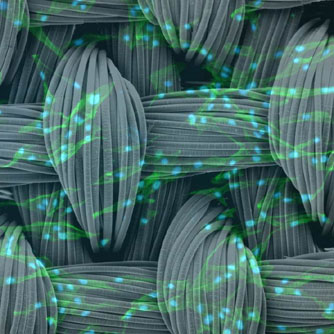By combining a synthetic scaffolding material with gene delivery techniques, researchers at Duke University (North Carolina, USA) are getting closer to being able to generate replacement cartilage where it’s needed in the body. Performing tissue repair with stem cells typically requires applying copious amounts of growth factor proteins—a task that is very expensive and becomes challenging once the developing material is implanted within a body. Farshid Guilak and colleagues identified a way around this limitation by genetically altering the stem cells to make the necessary growth factors all on their own. The researchers incorporated viruses used to deliver gene therapy to the stem cells into a synthetic material that serves as a template for tissue growth. Writing that: “The goal of this study was to develop a bioactive scaffold capable of mediating cell differentiation and formation of an extracellular matrix with the biochemical composition and mechanical features that mimic native tissue properties,” the study authors report that: “By combining innovative gene delivery strategies with advanced biomaterial design, we demonstrate the feasibility of generating constructs capable of restoring biological and mechanical function.”
Growing Cartilage Inside the Human Body
Jonathan M. Brunger, Nguyen P. T. Huynh, Caitlin M. Guenther, Pablo Perez-Pinera, Franklin T. Moutos, Farshid Guilak, et al. “Scaffold-mediated lentiviral transduction for functional tissue engineering of cartilage.” PNAS, February 18, 2014.
RELATED ARTICLES




